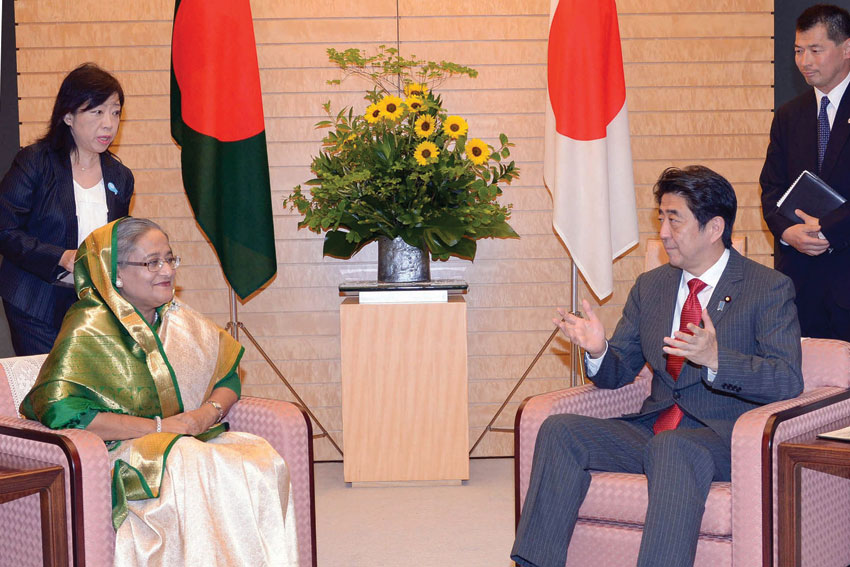Prime Minister Shinzo Abe has praised Bangladesh for its spectacular success in economic and social sectors and lauded Prime Minister Sheikh Hasina’s dynamic and visionary leadership

Japan is the single largest development partner of Bangladesh. The two countries are also engaged for the promotion of peace and prosperity through various bilateral and multilateral mechanisms. Financial and technical assistance from Japan has proved a force multiplier for Bangladesh in advancing its national development agenda. Now recent leaps forward in business relations have led to a rapid growth of trade
and investment.
Development partners
The maiden visit by Bangabandhu Sheikh Mujibur Rahman as the President of an independent country in 1973 set the tone for an influx of official Japanese development assistance for the war-ravaged Bangladesh. This assistance has been focused on key areas including power, roads and bridges, telecommunications, agriculture, health, education, water supply and sanitation, rural development, environment, and human resource development. This flow of development assistance from Japan has never diminished since then. In total Japan has committed more than $12 billion in aid during the last four decades, in the form of grants, loans, and technical assistance.
The historic official visit of Prime Minister Sheikh Hasina to Japan in May 2014 elevated the bilateral relationship to a level of ‘Comprehensive Partnership’. During the visit, Prime Minister Sheikh Hasina noted her appreciation of Japan’s valuable contribution towards the socio-economic and infrastructural development of Bangladesh.
In turn, Prime Minister Shinzo Abe praised Bangladesh for its spectacular success in economic and social sectors and lauded Prime Minister Sheikh Hasina’s dynamic and visionary leadership in guiding Bangladesh towards becoming a middle-income country by 2021. During the visit, Mr. Abe made an announcement to provide up to 600 billion Yen (approximately $6 billion) to Bangladesh during the next four to five years under the initiative of the Bay of Bengal Industrial Growth Belt (Belt-B). Mr. Abe paid a return visit to Bangladesh on September 6-7, 2014, within five months of Prime Minister Sheikh Hasina’s visit
to Japan.
Agents of peace and prosperity
Mr. Abe further reaffirmed that Japan would remain a trusted friend and partner of Bangladesh in promoting peace, stability, and progress at a regional and global level. Currently the two governments are working together to develop a specially designed training facility in Dhaka – the proposed Peace Building Centre. In line with existing initiatives, implemented through the framework of Japan-Bangladesh-UN tripartite training cooperation, these efforts in addition to the Peace Building Centre are focused on capacity building for personnel deployed on UN missions.
Such policies are in line with a belief by both prime ministers that a proactive contribution to peace is a necessary approach to the resolution of international disputes. They both underscored the need for renewed efforts by international actors to resume the Middle East Peace Process to ensuring sustainable peace and security in the region. Mr. Abe has also lauded Bangladesh’s long-term hosting of a large numbers of refugees from Myanmar. Key initiatives for an inclusive agenda for Sustainable Development by Bangladesh for both peacemaking and peace building has been staked and supported by Japan.
Growth of economic ties, trade and investment
During Prime Minister Sheikh Hasina’s time in office commercial ties between Bangladesh and Japan have grown remarkably. Meeting with her Japanese counterpart, Prime Minister Sheikh Hasina has ensured the implementation of key business-linking strategies generated during the Joint Bangladesh-Japan Public-Private Economic Dialogue. This initiative has been critical to improving economic engagement. During this process Mr. Abe himself emphasized that location, competitive incentives, improvement of infrastructure, and labor supply are critical factors for Special Economic Zones (SEZs).
Emphasizing the importance of expanding overall bilateral economic relations including bilateral trade, the two prime ministers also supported high level events to link business groups. These include the prestigious Bangladesh-Japan Business Forum organized by key stakeholders: the Japan External Trade Organization (JETRO), the Board of Investment (BOI) of Bangladesh and the Federation of Bangladesh Chamber of Commerce and Industry (FBCCI).
Japanese entrepreneurs and business people have also shown a keen interest in investment opportunities in Bangladesh. Recently Japanese companies have made important business deals pertaining to textiles, garments, IT, power generation and distribution systems, infrastructure and communication networks as well as banking and insurance operations. The huge interest of Japanese firms in undertaking business initiatives has raised the overall value of Japanese investment in Bangladesh to almost $1 billion.
Considerable progress has been made so far in the establishment of an SEZ for Japanese investors in close proximity to the capital Dhaka. Bilateral trade in 2014 was estimated at $2.1 billion. Bangladesh’s exports to Japan amounted to $862 million during this period. In fact Japan-bound exports have doubled since Prime Minister Sheikh Hasina was elected in 2009.
0 COMMENTS